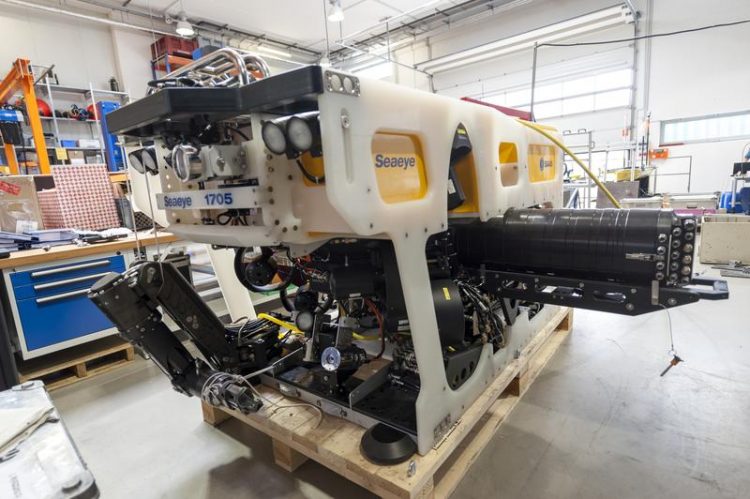One-Armed Deep-Sea Research

The diving vehicle MARUM-SQUID V. Diekamp, MARUM
On Monday, July 13th, the Center for Marine Environmental Sciences in Bremen/Germany received its new submersible, the MARUM-SQUID. The remotely operated vehicle can be deployed down to 2,000 meters.
In the near future it will prove invaluable in investigations of such deep-sea phenomena as cold-water corals and gas seeps, as well as hydrothermal vents on the sea floor, the so-called black and white smokers. The vehicle is equipped with a still camera and a high-resolution video camera.
Its hydraulically powered multi-function manipulator, made of stainless steel, is able to collect samples as heavy as 68 kilograms. – MARUM-SQUID nicely complements the institute’s existing fleet of autonomous and remotely operated diving vehicles.
Basic facts MARUM-SQUID:
Length: 2.10 m
Height: 1.17 m
Width: 1.16 m
Weight: 1,200 kg
Chassis:Polypropylene, stainless steel
Propulsion: 11 thrusters
Forward speed: 3.5 knots
Depth rating: 2,000 m
Payload: 100 kg
Manipulator: 7 functions, 1.5 m reach,
Lift at full extension: 68 kg, max. lift: 250 kg
Further Informationen / Interviews / Photos:
Albert Gerdes
MARUM Public Relations
Tel.: +49 – 421 218 65540
Email: agerdes@marum.de
Media Contact
All latest news from the category: Earth Sciences
Earth Sciences (also referred to as Geosciences), which deals with basic issues surrounding our planet, plays a vital role in the area of energy and raw materials supply.
Earth Sciences comprises subjects such as geology, geography, geological informatics, paleontology, mineralogy, petrography, crystallography, geophysics, geodesy, glaciology, cartography, photogrammetry, meteorology and seismology, early-warning systems, earthquake research and polar research.
Newest articles

Compact LCOS Microdisplay with Fast CMOS Backplane
…for High-Speed Light Modulation. Researchers from the Fraunhofer Institute for Photonic Microsystems IPMS, in collaboration with HOLOEYE Photonics AG, have developed a compact LCOS microdisplay with high refresh rates that…

New perspectives for material detection
CRC MARIE enters third funding period: A major success for terahertz research: Scientists at the University of Duisburg-Essen and the Ruhr University Bochum have been researching mobile material detection since…

CD Laboratory at TU Graz Researches New Semiconductor Materials
Using energy- and resource-saving methods, a research team at the Institute of Inorganic Chemistry at TU Graz aims to produce high-quality doped silicon layers for the electronics and solar industries….



